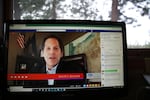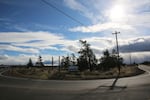Republican Rep. Greg Walden’s retirement after 22 years in Congress attracted a crowd of conservative politicians to the state’s only reliably red district.
GOP hopefuls pack the primary ballot. Four of the 11 candidates have raised the most money in pursuit of their party’s nomination. Knute Buehler, Jimmy Crumpacker, Cliff Bentz and Jason Atkinson collectively report roughly $2.5 million in campaign receipts.
The other Republican candidates who submitted information to be included in the voters' pamphlet include Bend City Council member Justin Livingston, self-described "career commoner" and business operator Travis Fager, and computer programmer Jeff Smith. Anti-government activist Kenneth Medenbach, David Campbell, Glenn Carey and Mark Roberts also appear on the ballot.
The Democrats in the race have raised too little to require campaign finance reports.
Once upon a time, any serious candidate in Oregon’s 2nd Congressional District would be pounding pavement east of the Cascades right about now, driving up to eight hours between campaign events, and shaking a lot of hands along the way.
“Traditionally they'd be going to VFW halls, going to the Elks lodge, going to county fairs and 4-H events,” said political strategist Chris Edmonds of Hubbell Communications, which isn’t working with any of the CD-2 candidates.

A collection of political signs in Deschutes County, Ore., between Bend and Redmond, Ore., on Monday, April 27, 2020.
Emily Cureton / OPB
The coronavirus pandemic has dramatically altered how the candidates are campaigning this year — and no one is certain what the winning strategy will be.
Edmonds predicts the stay-at-home order will advantage those with the better-known names and the most money to spend on advertising and targeted marketing.
“Because everybody's stuck inside. So what are they doing? They're watching TV. Or they're on social media, surfing the internet, and spending a lot of time in those digital spaces,” he said.
But there’s something special to keep in mind about Oregon’s 2nd Congressional District, according to strategist Rebecca Tweed, who worked on Buehler’s 2018 campaign for Oregon governor.

A political sign for Knute Buehler, running for office in Oregon's 2nd Congressional District, at a ranch in Deschutes County, Ore., on Monday, April 27, 2020.
Emily Cureton / OPB
“It’s larger than a number of states,” she said.
In fact, CD-2 is larger than most U.S. states, encompassing nearly 70,000 square miles of Eastern, Central and Southern Oregon, a terrain that typically keeps candidates on the road for months.
Unlike Edmonds, Tweed said she expects the forced break from road-tripping could even the playing field somewhat because candidates utilizing digital technology like Zoom and Facebook Live “actually have an opportunity to reach more voters and more constituents than they would have if they were traveling city to city or event to event.”
Public comments were a silent stream of text bubbles and emojis at a recent virtual forum hosted by the Central Oregon City Club and League of Women Voters last week.
The moderator navigated a few tech snafus before the opening question dropped: “How long have you been a resident in District 2?”

Jimmy Crumpacker, a candidate running for Congress in Oregon's 2nd Congressional District, as seen at a virtual forum hosted by the Central Oregon City Club on Wednesday, April 22, 2020.
Emily Cureton / OPB
The candidates answered in decades, except for one.
“One year,” Crumpacker said.
The former Portlander registered to vote in Deschutes County for the first time last year on Nov. 20 — three weeks after Walden announced he would retire.
A self-described commodities trader, he hasn’t held elected office before or even voted in more than half of Oregon’s elections since 2012.
Crumpacker canceled an interview for this story after appearing on OPB's "Think Out Loud."
So far, he's raised more than $834,000 in receipts as of the latest FEC filings, including a $200,000 loan to himself.
Related: Knute Buehler Runs To Succeed Greg Walden In Congress
Crumpacker is being backed by the state’s largest anti-abortion group. Oregon Right To Life pledged to defeat the other top fundraiser in the race, Buehler.
“That’s not unusual. I've had that almost every time I run for political office and it really centers around my pro-choice views,” Buehler said in a recent interview with OPB.
The former state representative from Bend reports over $1 million in campaign receipts. He's run for many state offices, and in this federal election, he's still branding himself in the voter pamphlet as tough on Gov. Kate Brown and "PDX liberals."
But, he’s taken heat within his own party for criticizing the Trump administration.
“I’ve always described myself as an independent-minded Republican. And when President Trump is right I agree with him, and when he’s wrong I disagree with him,” he said.

Former Oregon state rep and current congressional candidate for Oregon's 2nd Congressional District Knute Buehler speaks at a virtual form hosted by the Central Oregon City Club, on Wednesday, April 22, 2020.
Emily Cureton / OPB
His campaign strategy deploys attack ads against Crumpacker, and Buehler is getting raked in return by conservative political action committees, like an ad from Club For Growth claiming he "trashed" Trump.
Meanwhile, Ontario attorney Cliff Bentz wants GOP primary voters to consider the former state senator’s 12-year history with the minority party in Salem.
“I am a policy wonk. There's no doubt about it … I realized that if you're going to be successful [in the minority], you have to know more about the issue than anybody else.”
Bentz tends to focus on Eastern Oregon agricultural issues, while his campaign messaging stresses his nearly lifelong residency in the district, minus a few years away at law school.
Related: Oregon State Sen. Cliff Bentz Will Resign Early For Congressional Run
“I didn't get everything right, but I got most of it right, because I spent an awful lot of time trying to make sure I was doing what my district wanted,” said Bentz, who is the Oregon Cattlemen's Association pick for the open seat.
Bentz's campaign receipts are just under $400,000, including a $100,000 loan to himself.
And, there’s another former state lawmaker in this mix: Jason Atkinson of Southern Oregon, who has raised about $180,000 for his campaign.
He said his strength is grassroots campaigning.
“The other guys cannot buy what we've created. We have 20 counties, all organized, some stronger than others, of course, but starting back in November we organized county by county, precinct by precinct,” Atkinson told OPB.
That was before a pandemic shut down Oregon.

A campaign sign for Cliff Bentz, a former Oregon state senator running for Congress in the 2nd Congressional District, positioned at a bend in the road in Deschutes County, Ore., on Monday, April 27, 2020.
Emily Cureton / OPB
“One night I'm speaking to 200 people in Enterprise. And then, the next day, boom. Everything's canceled,” Atkinson recalled.
Now, his social media accounts often rail on the state's coronavirus response. He's encouraged rural residents to travel to rallies in Salem and protest stay-at-home orders, even as health officials plead for more time.
With just a few weeks left before the primary, it’s not clear which Republican strategy will win out.
What is clear: the open seat presents a once-in-a-lifetime opportunity for these candidates, and each hopes their campaign pivots will reach rural Oregon’s primary voters during an unprecedented crisis.
